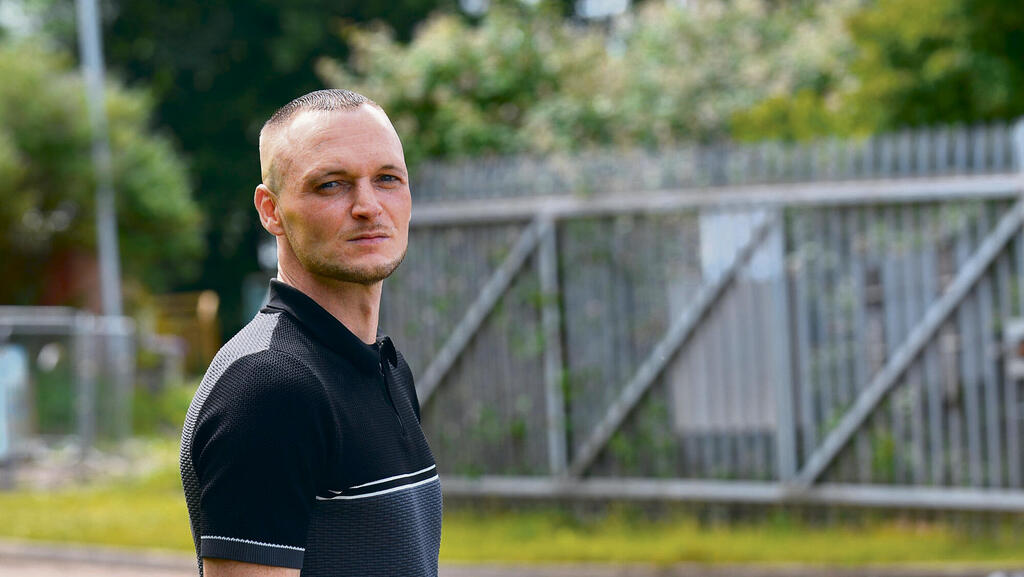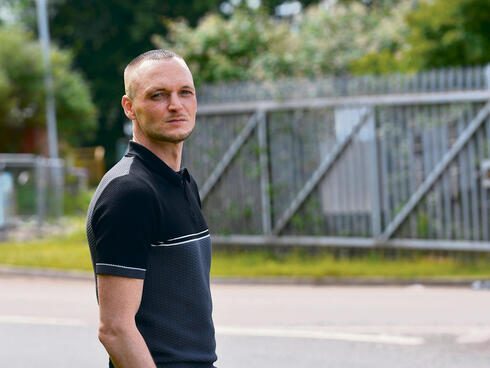
How to find 8,000 bitcoins buried under 110,000 tons of garbage
In the depths of a landfill in Wales rests a hard drive with bitcoins currently worth around $185 million. James Howells, the man who accidentally threw the drive in the trash nine years ago, explains his crazy plan to locate, extract and restore the lost coins
Nine years ago, in the middle of 2013, James Howells tidied up a messy desk drawer on top of which he kept his personal computer. He is an IT engineer, and accordingly it was full of computer equipment, chargers and cables of various kinds. It also had two hard drives, identical in appearance. One of them was empty and Howells intended to throw it away, because its volume was too small for the use he required. The second had 8,000 bitcoins.
Howells mined them four years earlier, at the beginning of 2009, when Bitcoin was just born and was still seen as a crazy idea that only utter geeks could digest. In fact, Howells, who was only 22 at the time, was one of the first five miners of the cryptocurrency. So he mined, and didn't think too much of it, and the coins lay on the hard disk in his drawer for four years.
Until that morning when "it was time to tidy up the drawer". Howells sorted, cleaned, and threw out the empty drive. Or so he thought. In retrospect he realized that he had confused the two: the drive that was thrown away, in a black bin bag that was sent to the landfill in Newport, Wales, where he lives, was the one with the bitcoin. 8,000 coins, which are now worth about $185 million. Less than a year ago, by the way, they were worth a little more than half a billion dollars.
"It was just an accident, it is what it is," he says with a solemn face to Calcalist in a Zoom interview that took place last week. "I don't blame anyone but myself for this. It's my bitcoin, I created it and I'm responsible for it. But luckily, unlike a lost lottery ticket, I still have a chance to find it. You know, a hard drive doesn't just disappear."
This heartbreak could easily suit a horror movie, but surprisingly, Howells' story only gets more interesting. In the first years after the accident, he focused his efforts on relatively modest attempts to convince city officials to allow him to enter the landfill and retrieve the treasure. "But they looked at me like 'who is this guy who wants to dig here and make a mess' and kicked me out," he says. According to Howells, the municipality of Newport, a city of about 160,000 inhabitants in South Wales, barely agreed to meet with him. According to them, digging a landfill entails enormous environmental damage, but Howells thinks this is an excuse: "The landfill is located near Newport Harbor, it is not a residential area. It makes no sense."
In his city, naturally, he has been known for years as the "bitcoin guy", but Howells' story spread far beyond the country's borders and made headlines all over the world. The interest in it only increased in parallel with the phenomenal value growth of the coins in the dump.
He is, of course, not the first person to lose his bitcoin. According to Chainalysis, a company specializing in crypto data, in the first 12 years of the currency's existence, approximately 3.5 million coins were lost, close to a fifth of all the coins mined up to that time. About a year and a half ago, an American programmer named Stephan Thomas made headlines after losing the password to 7,002 bitcoins in his possession. In 2019, a Reddit user confessed that he lost 10,000 coins after his mother threw his laptop in the trash.
However, Howells decided he won't give up. With the encouragement of a pair of European venture capitalists, Karl Wendeborn and Hanspeter Jaberg, he began formulating a grandiose plan of action. "About two years ago I thought to myself, 'Okay, if you don't want to deal with me,I will put together a professional team of businesses who do each of these tasks on a daily basis to a high standard and they will perform the task,'" he says.
Over the past two years, Howells built a "Dream Team'' for rescue missions of particularly dirty losses. This team is supposed to locate and retrieve the drive that has been resting in garbage juice for nine years, and then try to recover its precious contents.
"The main contractor of the project is Vertase FLI from Bristol, UK, which deals with digging in landfills and sorting waste for recycling," he describes. "They've also excavated a landfill in Wales, which means they've already dealt with all the environmental agencies we have to deal with, and know everyone there is to know."
I guess they still haven't had a mission such as locating a small item almost a decade after it was dumped in a landfill.
"I approached them and asked if they were capable of doing what they do on a daily basis in the Newport landfill. They replied in the affirmative. The plan is to put the garbage on conveyors and sort it."
Sort?
"An AI scanner made by Max AI from Oregon will sit above the conveyor belt and scan every item that will be transported on it. It will be 'trained' to locate the hard disk. When it locates such an item, it will send a call, and a robotic arm will pick it up automatically. And this is only one identification point as there will be another conveyor belt with manual sorters. An Additional point of identification will be a machine that will filter items based on size. These will be the three opportunities to find the drive - when all the other items will be recycled."
According to Howells' estimates from the past, sorting the entire landfill will take three years and will require filtering about 110,000 tons of garbage. The cost, he says, will amount to $11 million. An alternative, more modest plan, involves searching only the specific part of the landfill where the drive is believed to be located, and will take 18 months.
To ensure the success of the grandiose operation, he added to his dream team the former director of operations of the Newport landfill, who retired in 2018. "He designed and built the landfill," Howells says with sparkling eyes, "there is no person better suited to my team than him. It is a huge bonus that he is with us."
Other members of the team are a consultant who worked for the American company Ontrack, which successfully recovered 99% of the black box belonging to the space shuttle Columbia, which crashed in 2003 with astronaut Ilan Ramon on board; A asbestos and hazardous waste disposal specialist from the Welsh company Santia; as well as two robotic Spot "dogs" manufactured by American robotics corporation Boston Dynamics, or as Howells concludes with a bitter smile, "I built a crazy plan, and in the end the media only cares about the dogs." Their names, by the way, are Satoshi and Hal, after bitcoin creator Satoshi Nakamoto and Hal Finney, who received the first bitcoin transaction from Satoshi.
Why do you need robotic dogs?
"Because my story has been published all over the world, and as soon as we start digging in the landfill we will have to secure it to make sure that no one breaks into it at night and tries to steal the hard drive. This is a lot of money."
What is the role of the dogs?
"They will have infrared eyes and they will scan the premises. There will also be a human security guard and closed-circuit cameras, but the dogs will help. The truth is that I wanted them because with the infrared eyes they can prevent a situation where we find the hard disk and accidentally destroy it. So, during the night they will be security guards, and during the day they will be part of the scanning force."
Please explain.
"The issue is drop distances. There will be a bucket that will lift the waste onto the scanning conveyor. Now imagine that the bucket picks up the drive when it is in perfect condition and it falls from a height of 20 meters. We may still destroy it with our own hands. That is why we want to locate the drive at the earliest opportunity. And the robot dogs, which will also be equipped with an AI system, can help us scan the buckets even before the arm lifts them in the air."
No one can guarantee that the operation will be successful, that the drive will even be found or that its contents will be recoverable. In the meantime, he is facing a much more mundane and bureaucratic difficulty, which he is unable to solve: adamant opposition from the city council to the whole matter.
Even when Calcalist contacted the municipality of Newport, their response was firm: "The council has told Mr. Howells multiple times that excavation is not possible under our environmental permit, and that work of that nature would have a huge negative environmental impact on the surrounding area… We would also have to close the site for Mr. Howells to carry out his work. We are a public sector body, and our duty is to provide services to our residents, not sanction speculative excavation work which would hinder delivery of those services. There is also no guarantee that the hard drive is even in the landfill site, and even if it was, the chance of it being found and in a recoverable condition after being in a landfill site for nine years, exposed to high pressures and a corrosive environment, are extremely slim. We have been very clear and consistent in our responses that we cannot assist Mr. Howells in this matter
Howells, on his part, claims that his crazy plan not only won't harm the city, it holds great value for it. "This is not just a hard drive search project", he insists. "That is just one problem. As part of my investigation for the project I found out that this landfill is actually quite dirty, so it also became a landfill reclamation project. That section of the landfill, when itwas buried in the ground, there were no recycling procedures in places, and we believe that about 75% of the contents can be recycled there. So I'm not only doing this for myself, but also to fix previous mistakes. If we succeed, we can build a solar farm or wind turbines on the land that will be vacated by the landfill, for example."
Have you presented this plan to the municipality yet?
"Unfortunately not yet. Last week I sent an email to all the important decision-makers - Newport council members, cabinet members, the British parliament for the region. I would very much like to meet with them and discuss our plan as a business plan. I just don't understand why they are so difficult. If there was a real reason not to dig in a landfill, for example, if there is nuclear waste there, I would hold my hands up and say fine. It can’t be done. But this is not the case."
Do you think the difficulty lies in the digital nature of the matter? If it was a backpack with $180 million would they ignore you like this?
"There is perhaps the fear and misunderstanding of bitcoin here that could be a part of it. The fact that they are not even willing to meet with me is complete madness, considering the amount of money involved. Any CEO of any company turning this down would be fired on the spot."
Here Howells means that according to his plan, if all goes well, the municipality and its residents will also share in the spoils. "If we succeed," he says, "I will leave with approximately 30% of the money, the investors with 30%, and the rescue team with 30%. 10% will go to the community and environmental projects." On various occasions he also promised to distribute small sums to all the residents of Newport. "I want to create a crypto economy in Newport," he says with twinkling eyes. "It will be possible to place points of sale in every business in the city. My idea is to upgrade South Wales, which was known as a coal mining area, and bring it into the 21st century by turning it into a bitcoin mining area."
After this huge investment on your part, will you settle for less than a third of the money?
"Look, it's better if everyone enjoys it. I've already accepted my fate, I won't be able to get 100% of the coins back and I'm fine with that, there's no need to be greedy."
Related articles:
And if you succeed, against all odds, what will you do with the money?
"I try not to think that far ahead, otherwise you drive yourself crazy. It's the same as if you asked any ordinary person what would you do if you won the lottery. There are many things I want to do, many businesses I want to launch, and for that I need funding. This is what I want right now, more than anything else."
What is the likelihood that a hard drive is still recoverable after so long?
"It all depends on the condition in which it is found. If it is smashed into a million pieces, for example, the story is over. But if it is in reasonable condition - and I mean the internal board - then according to my data recovery associates, chances are high."
How high?
"80%-90%. The truth is that even if the drive is cut in half, there is a new technology that can save it. It is expensive and takes a lot of time, with very low chances of success, but it exists."
You realize how low the odds are. Could there be a situation where in the end you just forget about the whole thing?
"No. And my investors also have limitless patience. They too, like me, know that a hard drive does not crumble like a piece of paper. If 50 years had passed, I would give up. But there are still many years before you lose all hope, and the good thing is that city council members change all the time. Until now I've been courting the openings like Oliver Twist, but I've changed my approach. Right now I just want to sit down with the members and offer them a business proposal that everyone can benefit from."
But they are refusing.
"We’ve just had elections here in South Wales, so it’s going to be another five years until the next election. However, there is always the chance that the next mayor will be pro-Bitcoin."

